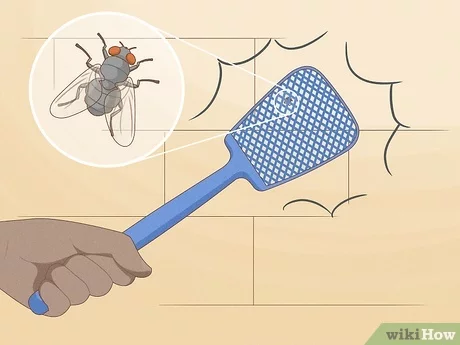Flies are some of the most irritating pests you can find buzzing around your home, especially during warmer months. They are a nuisance and can also carry diseases and spread bacteria wherever they land. You’re not alone if you’ve been struggling to kill flies and keep them away. This article will explore practical, humane, and safe ways to eliminate these unwanted visitors and prevent them from returning.
Read on to learn everything you need to know about how to kill flies, prevent infestations, and keep your home fly-free.
Why Do We Need to Kill Flies?
kill flies can be more than just annoying. They carry harmful bacteria and viruses that can lead to serious health risks. Houseflies are known to spread pathogens that cause food poisoning, cholera, dysentery, and typhoid. They pick up germs from garbage, animal waste, and other unsanitary places, transferring them to your food and surfaces.
If flies take over your home, knowing how to kill flies effectively is critical to protecting your family’s health. Eliminating them isn’t just about comfort; it’s about keeping your space clean and disease-free.
Types of Common Flies Found Indoors
Different types of kill flies may invade your space, and it helps to identify which kind you’re dealing with. Here are a few common household flies:
- Houseflies: These are the most common flies found indoors. They’re grey with four black stripes on their back and are about 1/4 inch long.
- Fruit Flies: Small and reddish-brown fruit flies are attracted to ripe or decaying fruits and vegetables.
- Drain Flies: These tiny flies resemble moths and are often found around sinks, showers, and drains.
- Blow Flies: Shiny green or blue, blow flies are attracted to decaying meat and can be found around garbage or pet waste.
Each type of fly has different preferences and habits, so the methods for getting rid of them can vary. Understanding the kind of fly you’re dealing with can make how to kill flies easier and more effective.
Simple Ways to Kill Flies Quickly
Let’s dive into some quick methods for killing flies. Whether you’re looking for natural remedies or store-bought solutions, here are some of the most effective techniques:
- Swat Them with a Fly Swatter
A classic kill flies swatter is one of the most straightforward tools for dealing with flies. A quick swat can kill flies on contact. Fly swatters are cheap, easy to use, and don’t involve chemicals. For the best results:
- Wait for the fly to settle before striking.
- Aim just slightly behind the fly to catch it in mid-jump.
While this may be a short-term solution, it eliminates individual flies on the spot.
- Use Fly Traps
Fly traps are designed to attract and trap flies, preventing them from reproducing or spreading germs. Here are some types of fly traps you can try:
- Sticky Fly Paper: Sticky paper is coated with a sweet-smelling adhesive that lures flies, trapping them when they land. Place these near windows, doors, or garbage bins.
- Light Traps: Light traps use UV light to attract flies and trap or kill them with electric grids. They’re best used indoors and in dark areas where flies are attracted to the light.
Both sticky paper and light traps are easy to set up and practical for indoor use.
- Spray with Fly-Killing Spray
Fly sprays are an instant way to kill flies and are widely available in stores. Aerosol sprays are convenient but contain chemicals, so you’ll want to use them sparingly, especially around food and children. For best results:
- Spray directly on the fly for an immediate kill flies.
- Avoid using in food preparation areas or where pets frequent.
For a safer alternative, look for organic or plant-based sprays.
How to Kill Flies Naturally
If you’re concerned about using chemicals, plenty of natural methods exist to kill flies. Here’s how to kill flies naturally using common household ingredients.
- Vinegar and Dish Soap Trap
A simple vinegar and dish soap trap is highly effective for catching fruit flies and houseflies. Here’s how to make it:
- Pour a little apple cider vinegar into a bowl.
- Add a few drops of dish soap and mix.
- Cover the bowl with plastic wrap and poke small holes.
Flies attract the vinegar’s scent, but the dish soap breaks the surface tension, trapping them in the liquid.
- Homemade Essential Oil Spray
Due to their strong smell, essential oils like peppermint, eucalyptus, and lavender repel flies. To make a natural fly spray:
- Mix 10-15 drops of essential oil with water in a spray bottle.
- Spray the mixture around doorways, windows, and other entry points.
This solution is non-toxic and also leaves a pleasant aroma around your home.
How to Prevent Flies from Entering Your Home
Prevention is the best way to keep flies out and avoid the hassle of dealing with an infestation. Here are some practical steps to help prevent flies from coming indoors.
- Keep Food Covered and Dispose of Garbage
Flies are attracted to food and waste. Keeping food appropriately stored and garbage covered removes their primary source of attraction.
- Cover all food: Store fruits, vegetables, and leftovers in the fridge or airtight containers.
- Take out the trash regularly, mainly if it contains food scraps.
- Use a trash can with a lid to prevent flies from getting inside.
- Seal Doors and Windows
Flies can quickly enter through cracks and gaps in your home’s exterior. Make sure all doors, windows, and vents are properly sealed.
- Install window screens to prevent flies from entering.
- Repair any torn screens and close windows without screens.
- Use weather stripping around doors to close off small gaps.
Best Home Remedies to Kill Flies
If you’re interested in simple, cost-effective home remedies, here are a few tried-and-true methods.
- Lemon and Clove Deterrent
Lemon and clove act as natural fly repellents. To use this method:
- Slice a lemon in half.
- Stick a few cloves into the lemon.
- Place it near windows or other areas where flies enter.
The strong scent repels flies, keeping them from hanging around.
- Basil and Mint Plants
Certain plants are natural fly deterrents. Basil and mint are particularly effective and easy to grow indoors. Simply place a pot of these plants near windows or doorways to repel flies.
- Basil: Flies hate the smell of basil. Keep a few potted basil plants around your home for a fresh, natural deterrent.
- Mint: Mint leaves have a strong aroma that flies avoid. Use fresh mint or dried mint sachets around fly-prone areas.
The Do’s and Don’ts of Killing Flies
There are a few things to keep in mind for safety and effectiveness when it comes to getting rid of flies.
Do’s
- Clean up spills and crumbs right away to avoid attracting flies.
- Do use natural remedies if you’re concerned about chemicals.
- Do place fly traps in high-traffic fly areas to maximize their effectiveness.
Don’ts
- Don’t use chemical sprays near food or on kitchen counters.
- Make sure to leave windows or doors with screens, giving flies easy entry.
- Don’t leave standing water like in sinks, as flies attract moisture.
Table: Comparison of Fly Control Methods
MethodEffectivenessSafetyCostEase of Use
Fly Swatter High Very Safe Low Easy
Vinegar & Dish Soap Medium Safe Very Low Easy
Fly Spray High Use with Caution Medium Moderate
Light Trap High Safe High Easy
Essential Oil Spray Medium Very Safe Low Easy
Lemon & Clove Medium Very Safe Very Low Easy
Basil and Mint Plants Medium Very Safe Low Easy
Conclusion: Keeping Your Home Fly-Free
Dealing with flies can be frustrating, but you can protect your home and family from these pesky intruders by understanding how to kill flies effectively. Whether you choose chemical solutions, natural remedies, or preventive measures, each method has pros and cons. Remember, the best approach is often a combination of techniques to kill and keep flies out.
So, the next time you spot a fly buzzing around, you’ll know exactly what to do. With a little effort and the proper techniques, you can enjoy a fly-free home all season long.




